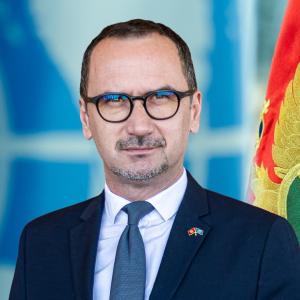UN and the leading hip-hop band in Montenegro together against gender violence
27 November 2017
- My Mary is the story a woman living with various types of violence, some visible and some more hidden or indirect. It is narrated from the perspective of a stereotypical husband, the story of Mary exposes different traditional and cultural dimension of violence against women that largely remain a taboo.
“My Mary” (Moja Mare) is the title of the latest song produced by the hip-hop band Who See, developed in partnership with the United Nations in Montenegro, within this year’s 16 Days Campaign Against Gender-Based Violence. The campaign aims to send a message to young people about the different types of “violence” against women, to help young people to recognize it and to have a constructive attitude to fighting all forms of violence as they grow up.
My Mary is the story a woman living with various types of violence, some visible and some more hidden or indirect. It is narrated from the perspective of a stereotypical husband, the story of Mary exposes different traditional and cultural dimension of violence against women that largely remain a taboo.
“Violence against women is a deeply rooted and a very complex problem. Its elimination takes time, and changes in ‘acceptable behaviour’ of succession of generations. And that’s why we focus on the youth in this campaign” – said Fiona McCluney, UN Resident Coordinator in Montenegro, while expressing honest gratitude for Who See band’s contribution to the campaign. “The band Who See are very popular and trusted by young people making them an excellent way to get this year’s campaign messages on Violence against Women to young people. We are very grateful and proud of our partnership with the band” – McCluney concluded.
Young people like and trust the band Who See, so they’re a priceless way to get out messages on Violence against Women.
Fiona McCluney, UN Resident Coordinator in Montenegro
Indeed, tailoring messages for young people and the large-scale outreach to youth were the main reasons for UN in Montenegro to initiate partnership with Who See in this campaign.
“Working on this song was very challenging for us, since violence against women is a wide-spread problem manifested in different forms, as we pointed out in the song. Mary portrays a woman that, I believe, many women can identify with nowadays in Montenegro” – said Dejan Dedovic – Deda from the Who See band, who expressed true pleasure with partnership with the UN in Montenegro.
"Mary portrays a woman that many women may identify with today in Montenegro”
Dejan Dedovic – Deda, Who See
Violence against women is one of the most prevailing forms of human rights violation. It can be physical, sexual, psychological and economic. According to UNDP’s latest research, one in two women was a victim of violence at least once in her lifetime. After reporting the violence, victims often remain unprotected and deprived of an adequate systematic support. Hence, most victims never report the violence: 2/3 of them fear the consequences, 1/4 of them are ashamed. To change these practices, it is necessary to have an open public dialogue on violence against women.
The song “My Mary”, which tackles various forms of violence against women, unveils it as a socially invisible issue that remains unaddressed.
Until when? – asks Who See.




